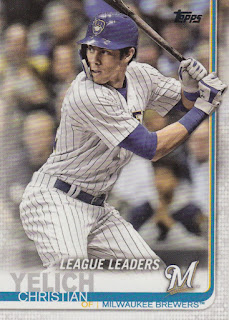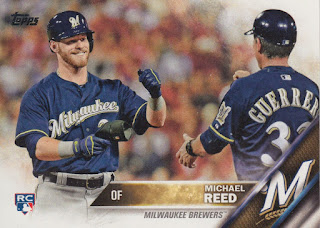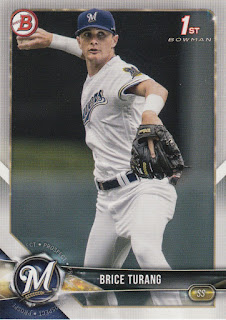As is usual in September for teams going nowhere, the 1970 Brewers called up a few guys from the minors to give them an opportunity to be around the big club and dip their toes into the big league...
As is usual in September for teams going nowhere, the 1970 Brewers called up a few guys from the minors to give them an opportunity to be around the big club and dip their toes into the big league waters. Such was the case on September 7, 1970, when another tall righty pitcher from the Brewers system made his debut in the first game of a doubleheader.Six-foot, six-inch tall Wayne Twitchell was summoned from the bullpen for the bottom of the fifth inning with the Brewers having rebounded in the top of the inning from 7-1 down to pull within 7-4 against the Minnesota Twins. Twitchell was tossed into the deep end -- he was asked to face the heart of the Twins order...the 4-5-6 hitters. The first guy Twitchell ever faced in the big leagues was Hall of Famer Harmon Killebrew, and Twitchell struck him out. In fact, Twitchell struck out all three guys he got for outs in his first inning of work -- sandwiching an error by Roberto Pena and a walk in between each out.
 |
| 1971 Topps/O-Pee-Chee |
Wayne Lee Twitchell was born on March 10, 1948 in Portland, Oregon. As is often the case for players in this era, Twitchell was a multisport star in high school and was named to the Oregon All-State team in both football and baseball. According to the excellent SABR biography for Twitchell, he had the chance to play college football at Arizona State. If he had done that, he would have been following in his father's footsteps, as his dad was a standout running back for Oregon State in the 1930s.
When decision time came, however, a new option had arisen. Twitchell was selected third overall in the 1966 MLB Draft by the Houston Astros -- behind complete washout Steve Chilcott and Hall of Famer Reggie Jackson. Twitchell's dad had warned Wayne that his family had a history of knee problems, and those problems would have only been exacerbated by trying to play football.
So, baseball it was. Twitchell was known for being a hard thrower with questionable command, and he toiled for four up-and-down seasons in the Astros organization. As he put it himself, "I always seem[ed] to have the knack of always bringing the teacher out in people. I was taught close to 20 different deliveries, which complicated things."
The Astros gave up on Twitchell in November of 1969 and sold his contract to the Seattle Pilots. Twitchell was ecstatic to be pitching back in the Pacific Northwest. That ecstasy was dashed when the team was sold and moved to Milwaukee, but Twitchell spent 1970 at home in Portland in Triple-A -- and met his future wife that year as well.
Twitchell only appeared in 2 games for the Brewers in September of 1970. His second outing was much worse than the first, as he gave up three hits and two earned runs in 2/3 of an inning. Interestingly, Twitchell recorded those two outs by way of a strikeout as well. So, for his Brewers "career," Twitchell has a K/9 of 27. Only the immortal Ray Krawcyzk of the 1989 Brewers finished with more Ks and a K/9 of 27, striking out 6 in 2 innings of work on April 28, 1989 in his only Brewers appearance.
Still, things between Twitchell and Milwaukee were not good. Twitchell's SABR bio quotes him as saying that he "just didn't fit in with Milwaukee. They had their ideas about pitching and it wasn't about my style. I was a fastball pitcher and they were trying to make me into a spot pitcher." This quote makes me wonder if, perhaps, the organizational ethos over the years held back the team from developing pitchers. Obviously things changed a lot in the early years, and that couldn't have helped either.
 |
| 1994 Miller 25th Anniversary Set |
Despite being a 22-year-old pitcher with a history of being a first round pick and for whatever reason, the Brewers gave up on Twitchell quickly as well. At the end of spring training in 1971, Twitchell was traded to Philadelphia for minor league outfielder Patrick Srkable. Skrable played one year of 70 games in Triple-A for Milwaukee and was done. Twitchell himself said that he almost quit baseball after he was traded.
Thankfully for him, he was sent first to Triple-A Eugene in Oregon. Surrounded by family and his new wife and having a manager in Andy Seminick who left him alone, Twitchell pitched for the last time in the minor leagues -- because he spent the next 9 seasons in the major leagues. Called up to the majors in 1971, Twitchell blossomed in Philadelphia and made the All-Star team in 1973.
Unfortunately, just as Wayne was getting on a roll, those knee problems from the Twitchell family history kicked up. Billy Williams of the Chicago Cubs was trying to beat out an infield single on September 18, 1973 at Wrigley Field and slid head first into Twitchell's knee. That was the end of his season and led to a four-hour surgery and eight weeks in a full leg cast. The rehab was brutal and necessary; his doctor told him that if he didn't follow his rehab to the tee "you'll never walk normal again."
From that 1973 season, it was downhill. Twitchell stayed in Philadelphia into 1977, with his only real success being in 1976 -- a 1.75 ERA and a 3.72 K/BB ratio working mainly as a reliever. Stats like that make me wonder if he wasn't misplaced in the starting rotation. He was traded in 1977 to the Expos on June 15, and stayed there through the 1978 season. In 1979, he pitched in 33 games for the Mets before his contract was purchased in August of 1979 by Seattle. Finally getting to pitch for his "hometown" team had to be a pleasure for him, but he was released after the season and was done with baseball.
After his baseball career, he moved back to Oregon and became a commercial real-estate broker. He fought cancer for quite some time, but lost that battle on September 16, 2010, aged just 62 years old.
The three cards that picture Twitchell as a Brewer are shown above. I don't have any of the 1971 cards, as that card is from the difficult-to-find high number set. Weirdly, by the time that the card came out, Twitchell had long since been traded to Philly, but I guess that card had been designed long before. It's also weird to me that the Brewers/Miller used a New York Mets photo for his 1994 Miller card -- I guess it's all they could find.












